Dr. Ron Hunninghake, MD, and Dr. Lucas Tims, ND, FABNO, have recently completed the Metabolic Approach to Cancer Certification Program with Dr. Nasha Winters. In the latest episode of the Real Health Podcast, Dr. Ron and Dr. Lucas discuss the importance of getting to the root cause of cancer by testing, assessing, and addressing the whole person.
Thank You To This Episode’s Sponsor
Episode Transcript
Disclaimer: The information contained on The Real Health Podcast and the resources mentioned are for educational purposes only. They are not intended as, and shall not be understood or construed as medical or health advice. The information contained on this podcast is not a substitute for medical or health advice from a professional who is aware of the facts and circumstances of your individual situation. Information provided by hosts and guests on The Real Health Podcast or the use of any products or services mentioned does not create a practitioner patient relationship between you and any person’s affiliated with this podcast.
Intro: This is The Real Health Podcast brought to you by Riordan Clinic. Our mission is to bring you the latest information and top experts in functional and integrative medicine, to help you make informed decisions on your path to real health.
Dr. Ron Hunninghake: Okay. Welcome everyone. This is Dr. Ron Hunninghake. We’re back with another episode of The Real Health Podcast. And it’s my pleasure today to once again, welcome Dr. Lucas Tims, who is the director, the medical director of the Riordan Clinic Integrative Oncology Center in Kansas City. So Dr. Tims, thank you so much for coming on our broadcast again.
Dr. Lucas Tims: My pleasure Dr. Ron, thanks for having me. And I look forward to jumping into some juicy content today.
Dr. Ron Hunninghake: Yeah. So a lot of people have heard, are starting to hear more about integrative oncology and we’ve talked about it before. We thought maybe today we would take a little bit of a deeper dive into the distinction between what’s going on in both Wichita and Kansas City with our cancer care patients, looking at the model of care that has been developed. And seeing if we can make the distinguishing features between our approach and conventional oncology. So would you want to kind of give us a thumbnail sketch of that as best you can?
Dr. Lucas Tims: Yeah. I’d love to. This is something that obviously … It’s usually a place I start in my initial consultation with my patients. Some of them kind of already understand it, but I kind of go through this as an opening, if you will, with most of my patients just to kind of set that groundwork and the expectations. Because I do find that when they understand where we’re coming from, it helps them actually follow our instructions better and even make sense of it better on their end. And so what I usually start with telling patients is that our approach, and we may get to the actual what we want to call it, a little bit later. But our approach is much more a metabolic or terrain based approach to cancer. And patients may have heard those terms used other places, Dr. Nasha Winters wrote a book called The Metabolic Approach to Cancer.
Dr. Lucas Tims: But when you think about the metabolic approach or terrain based approach, where it really differs, and the analogy I like to use is if you think of cancer as like a weed problem, and think of kind of your body as like the garden. And so these weeds are popping up, and the traditional approach from Western medicine towards cancer or the weeds is, oh, we see weeds, let’s kill the weeds. Let’s put some chemicals on them or weed control, somehow, cut them out, burn them and then just wait and see if they come back. Whereas the metabolic or terrain based approach comes at it really from the soil standpoint and looking at all those things that you really can’t see on the surface level, but that we know are actually what’s driving the weed problem in the first place.
Dr. Ron Hunninghake: And this is just right in line with the historical development of Dr. Riordan’s approach to dealing with complex chronic illnesses of all types. Namely, he said, we’ve got to look for the root causes. And so the analogy is perfect in the sense that the roots are where the plant gains its health. And well of obviously sunshine and external air and care too. But the deep root causes are the things that often get overlooked in developing a holistic or broad based treatment plan for our cancer patients.
Dr. Lucas Tims: Yeah, exactly. And so we take, just as a gardener or a landscape expert might look at a weed and say, oh you’re missing this mineral, or there’s a deficiency in this, in the soil. And that’s why you’re getting these weeds. Yes, they may do some weed control if they’re out of hand, but ultimately a good gardener, a good landscaper’s going to know that the real magic’s down in the soil.
Dr. Ron Hunninghake: And to add once again, to the analogy, if all we did was treat the weed without changing the soil, the weed could grow back. And taking breast cancer as a sad example, there’s about a 70% recurrence rate that occur in breast cancer patients, even if they have the very best of conventional care. So we’re really trying to cover both ends of the spectrum.
Dr. Lucas Tims: Yeah, 100%. Not only, like I said, sometimes you do need to do weed control, but the prevention of the weeds from coming back. And to piggyback on that a little further, usually when the weeds come back, they’re much harder to get rid of the next time.
Dr. Ron Hunninghake: Yeah.
Dr. Lucas Tims: Much more resistant, much more aggressive. So yeah, doing that the first time around is really when you want to do that soil work.
Dr. Ron Hunninghake: Yep. And so there are 10 terrains, both you and I have completed the Metabolic Approach to Cancer Course under Dr. Nasha Winters. And it was an incredible, almost 40 to 50 hours of video and learning that we had to go through. And what I wanted to try to do today is to pick your brain and go over these 10 terrains that form the basis of this soil, getting to the root cause of cancer. And so my wife was pointing out, pneumonics are always helpful. And so Roy G. Biv is a famous pneumonic to remember the colors of the rainbow. So what I’m going to do is have you kind of fill us in, but I’m going to kind of define this in four different groups of the 10 terrains. And so the first group is the EME group, so it’s epigenetic, metabolic and environmental. And so how do these factors fit together in your mind in terms of root causes for cancer?
Dr. Lucas Tims: Yeah. I like that you’ve done the groupings and I think it’s also important to point out that all of these terrains kind of … Dr. Nasha likes to use the word cross pollinate, meaning that they all … Like one stone in the pond will cause ripple effects in all of these terrains. But I think it is helpful for maybe the listeners to think about in these groupings. So that first one of epigenetics, metabolic and environment, I think that’s where you get a lot of the stuff that we can pick up in laboratory testing, which is good, which is a lot of what we do with our patients as a first step is to do a terrain based test. And you can pick up on changes in genetics, metabolic markers of disease, whether it’s glucose, insulin, other growth factors, cholesterol, body mass index, those types of traditional metabolic markers and some deeper dive ones.
Dr. Lucas Tims: And then the environmental component, we do a very, very in depth, environmental toxin screen on our patients because that more than anything I think can affect both the metabolic, the epigenetic terrain and even really all the other ones. And we do find oftentimes that our cancer patients, the reason why they’re growing weeds is too much toxicity, and we’re living in such a toxic world now where we’re being exposed to stuff without really even knowing it. It’s become so ubiquitous and insidious these chemicals and toxins that damage our DNA, that disrupt our hormones, that turn on or off genes that shouldn’t be. And so that’s kind of how we look at that section is what’s causing the epigenetic because I should back up a little bit.
Dr. Lucas Tims: We all have a genetic code that’s kind of set in stone, but the epigenetics is what speaks to the part that actually gets expressed. So if you think of this huge switchboard of little dials, that’s your genetic code, but which dials are turned on and off, that’s the epigenetic part of it. And so our environment is what does that. Both good things in our environment may turn on the right switches and toxic things or bad things may turn on the wrong switches or vice versa. And then the metabolic health is what kind of brings it all together and can either make or break it really.
Dr. Ron Hunninghake: Yeah. In this first little section here, these are things that people have a lot more control over their own choices, and they can impact how the genetic factors express themselves based upon our choices. We can control metabolics based upon our food choices. And environmental, once we be come aware of where the toxins are, we can begin to look under the kitchen sink, we can look out in the garage, we can look out the shed where we’ve got all the chemicals that we’ve been using on our lawn and realize, oh my gosh, there were things that I didn’t even know were challenging the health of my cells. And now I know, now I can make better choices.
Dr. Lucas Tims: Well said.
Dr. Ron Hunninghake: Thank you. Well, I think we’re working together on this. So the second little pneumonic here is IA, inflammation and angiogenesis. And part of this is just to help people understand these terms so that they’re not so unfamiliar to people. Inflammation. We all know about that. What about angiogenesis and how do these two fit together?
Dr. Lucas Tims: Angiogenesis, or another good term for that is circulation or blood flow in the body. And so this is where if you have improper circulation or a lack of circulation because maybe you’re sedentary, you have a sedentary lifestyle, you’re not exercising enough. Or you’re prone to certain things like blood clots. Those could be signs that you’ve got a circulation issue. And one of the things that can kind of seed a cancer issue is stagnation in the body, circulation, blood stagnation. And so the angiogenesis is a little bit more of a complex term, in the way that it can be both good and bad because once you have a tumor, the angiogenesis can be something that’s driving blood flow to a tumor.
Dr. Lucas Tims: But obviously we want good angiogenesis to our vital organs, our heart, our liver, our kidneys, so that they can work properly. But this is oftentimes where we see imbalances in patients with cancer and oftentimes where you can impact it through diet, lifestyle, the foods you’re eating, supplements. And oftentimes it doesn’t have to be anything really fancy or complex. Sometimes the most basic daily practices can really shift things. Exercise, for example.
Advertisement: There’s a lot more to this conversation and it’s coming up right after a quick break. Today’s episode of The Real Health Podcast is brought to you by the Riordan Clinic Nutrient Store. The nutrient store is your resource for the highest quality nutritional supplements. Every supplement in the store is handpicked by the expert medical staff at Riordan Clinic providing you with the best quality, purity, consistency and effective dosing available. Visit store.riordanclinic.org to shop online.
Dr. Ron Hunninghake: And the inflammation part of this, inflammation usually goes … It’s where the body is trying to heal itself. And cancer has been described as the non-healing wound. And so oftentimes it sends out signals to get more blood vessels growing to the area of injury in order to heal it. But unfortunately that can also feed the cancer. And so we certainly do encourage people to eat phytonutrient rich foods that help stop the inflammation and the new blood vessel growth to the tumor site.
Dr. Ron Hunninghake: So let’s go on to the third area here. This is MI, so it’s not a heart attack, but it’s microbiome and immunity. So how do these two areas, you might want to tell our listeners a little bit more about what the microbiome is and why it’s so important?
Dr. Lucas Tims: Yeah, well, I don’t know if people, I think most people don’t really understand that we’re basically just big walking condominiums for bacteria and microbes. We’re more bacterial than we are human.
Dr. Ron Hunninghake: Wow.
Dr. Lucas Tims: Which I think is kind of crazy to think about.
Dr. Ron Hunninghake: It’s true. It’s true.
Dr. Lucas Tims: And so what that means is that you’re only as healthy as the bacteria that are living in your condominium. And so you want to make sure that you’ve got healthy tenants and that there’s good diversity. And how do we do that? Well, we do that through our diet mostly, but the other thing that’s been, the other wrench that’s been thrown in that in the last 30, 40, 60 years because of the industrial kind of evolution we’ve had is chemicals. And not just chemicals, but even medications sometimes. These things really can disrupt our microbiome.
Dr. Lucas Tims: And then that connection between the microbiome and that other terrain tenant you mentioned, which is immunity, 80% of our immune system is located in our gut, which is where, that’s the hotspot for most of the microbiome. Although we have bacteria all over our body, the gut is really where there’s a lot of that magic happening and it’s the most populated area with bacteria. And so if you’ve got the wrong balance, if you’re lacking enough good bacteria or you’ve got overgrowth of pathogenic bacteria or viruses or things that are out of balance, all of a sudden that doesn’t just cause stomach aches and cramping and bloating, but it actually makes your immune system much weaker or sometimes it makes it too overactive, which is what you see a lot with autoimmune diseases.
Dr. Ron Hunninghake: Right. Right. So hopefully our audience is getting the picture that really taking good care in a cancer situation means you have to take care of all parts of your body. These basic functioning aspects of good health are a necessary part of overcoming the growth of the cancer. So it’s not just attacking the tumor, it’s improving the health of our soil through these various components. And so let’s go to this last grouping here. This is the CSE, circadian cycles, stress and emotional trauma. This is the part that when you talk to cancer patients, very often they will tell you they’ve had difficulties in their life and then the cancer emerged. How do you determine this when you’re interviewing a new cancer patient that you’re taking care of?
Dr. Lucas Tims: Yeah, this can sometimes be the real X factor or linchpin for a lot of people with cancer. Because even with all the stuff we’ve talked about in terms of immunity and genetics and environment and all that, these almost speak to an even deeper foundational piece of human existence and being a human being. And you can really see those ripple effects here with this category. I usually will just ask patients about what’s been going on the last, if they’ve been recently diagnosed, what’s been going on in your life the last 18 months? And by and large, it never fails that there’s at least one, if not multiple traumatic events or tragedies or griefs or something that’s really kind of shook their core. And so that mental, emotional piece is so important. And what does that usually throw off?
Dr. Lucas Tims: Usually it throws off your rhythms, your circadian rhythms. You’re not sleeping well because you’re stressed. You’re up all night because you’re stressed with work or you can’t sleep because you’re overindulging with substances to manage stress. It becomes kind of a very trick web. And so going through all those pieces with patients, helping them to find healthier ways to manage stress, to get back to a normal sleep wake cycle, to kind of reset the rhythms of the biology and their body and then to really flesh out and unlock some of the mental, emotional stuff that may be acting like a toxicity in their body as well.
Dr. Ron Hunninghake: Very well put. And this falls under this concept of test, assess, address. We’re really trying to look at the whole person. It’s not just testing their blood work. Though we do a very thorough job of that as well, but we’re trying to assess how well they’re coping with their life as a whole. Once someone has been given a cancer diagnosis, it truly is a life changing event and we’re helping them to get their foundation back in order so that they can put up really more than just a good fight. They can get into more of a healing mode. And this is the integrative part of integrative oncology.
Dr. Lucas Tims: Correct. Yeah. The test, assess, address. I mean, it’s really important and Dr. Nasha Winters who obviously put a lot of work into setting up this construct that we function in with more of a terrain based approach. She’s very big on doing it in that order. And so you and I, I know both adhere to that and that’s why we have to do so much testing upfront with our patients to really understand what’s going on in those soil conditions so that we can prioritize, because some people may have two or three terrain issues that are more important than others. And usually it’s not all 10 of them for everybody. At least that’s what we usually see. And so understanding where we need to prioritize first and sequence our approach is very important.
Dr. Ron Hunninghake: Yeah. So, so I know this will be a kind of a challenging listen for a lot of people, but I want them to understand, I hope they all understand that this component of cancer care oftentimes gets left out in an effort to just focus on getting rid of the tumor. But part of it is to help them maintain a good balance in their overall health, and to give them the stamina to go through whatever else they’re going through as part of their cancer treatment, and then not to leave any stone unturned that really needs to be worked on, or healed or improved nutritionally. All of these can come together in a way that a allows people to be more resilient in their journey through the cancer process. And so any last words, Dr. Tims, in terms of what you’ve learned about this … How long have you been an integrative oncologist?
Dr. Lucas Tims: Been practice nearly 13 years now, which has all been working directly with cancer patients. And I would be lying if I told you I know everything, but I do learn something new every day with my patients and from people like you and my colleagues and cancer is … Even though I feel this approach makes so much inherent sense. We’re still learning. We’re still perfecting. We’re still evolving to understand cancer. And I like patients to start to shift their mindset around cancer as being a teacher and not an enemy, that cancer can actually just more about ourselves and what we need to work on rather than it be this all guns blazing war that we need to wage on it.
Dr. Ron Hunninghake: Yeah. It’s a new metaphor that I tell my cancer patients that if you can absorb all this, get the right attitude, and start relearning a lot about self care, you’ll actually probably end up being healthier than you’ve ever been even though you’ve got a cancer diagnosis. And that is the secret of healing cancer. So Dr. Tims, thank you so much for all that you do, and thank you for today’s explanation and we’ll hope to have you on the show again soon.
Dr. Lucas Tims: Thanks for having me, Dr. Ron.
Outro: Thank you for listening to The Real Health Podcast. If you enjoyed this episode, be sure to subscribe and leave us a review. You can also find all of the episodes and show notes over at realhealthpodcast.org. Also be sure to visit riordanclinic.org, where you will find hundreds of videos and articles to help you create your own version of real health.


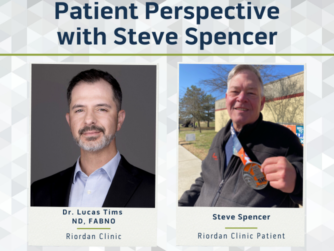
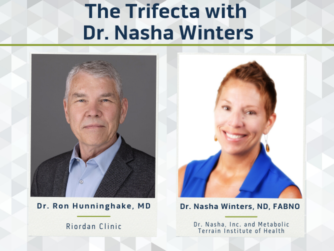
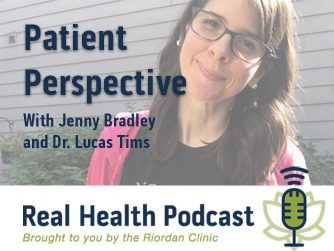
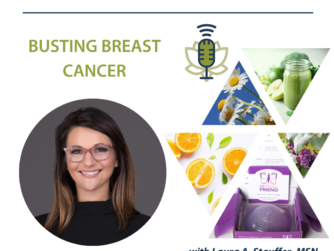
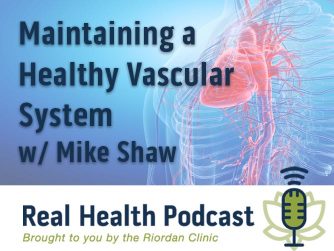
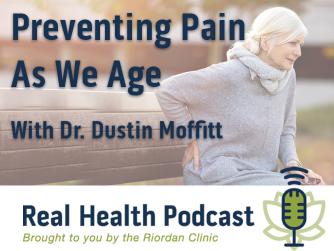
Thank you for the above podcast.
Even though I knew the information you gave, I still need to hear it again and again. I feel hopeless as a cancer victim as I refuse chemo/radiation, and even though I try to live healthy and firmly believe in it, it’s impossible for me to attain the Riordin approach because of lack of funds, as is probably the case for a great many others. Regardless, I so appreciate you both in your devotion, and pray the LORD’s blessing on you.